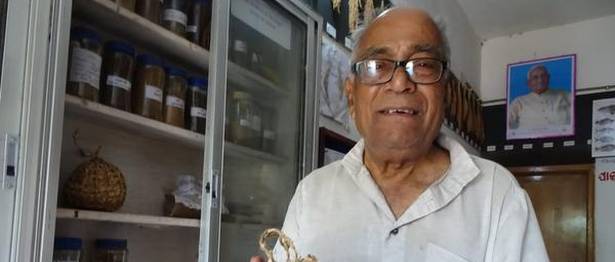
Odisha resident Sarangi gets a shot in the arm as State partners him in training farmers
When Natabar Sarangi started experimenting with ‘desi chasa’ in the mid-90s at a small paddy-growing village in Odisha, it was because of a serious practical problem rather than the growing buzz around organic farming.
One morning, a few hours after sprinkling a chemical pesticide on his land, he found dead fish and crabs floating around the paddy crop. This shook the retired schoolteacher, new to farming at that time, and he immediately decided to give up all chemicals and also motivate his fellow villagers to do so.
Twenty-four years later, for Sarangi and more than a thousand farmers he has trained, farming with organic nutrients, bio-pesticides and organic seeds has become a way for safe, economic and sustainable cultivation — a feat that has recently been recognised by the Odisha government.
Safe, sustainable farming
With the State now tying up with this tireless 86-year old farmer from Niali village and his research institute Rajendra Desi Chasa Gabesana Kendra for implementation of the government’s Paramparagata Krishi Vikash Yojana — a training programme on organic farming — thousands more are set to benefit.
“Twenty-four years ago, when I watched the person who put pesticide on my land faint and then found dead fish floating on the water surrounding my paddy, I was determined that the food I grow should not have chemical fertilisers or pesticides in it. I also needed to give up hybrid seeds as traditional inputs don’t work on them,” explains Sarangi.
“Thus began my journey towards safe and sustainable farming. I have managed to collect more than 700 varieties of indigenous rice seeds from across the country with some help from my fellow-farmers and also zeroed in on a large variety of organic fertilisers and pesticides,” he added.
Sarangi was soon joined by a handful of like-minded young farmers like Jubaraj Swain who were attracted to the concept. They started experimenting and training other farmers in traditional ways at the research institute that Sarangi set up in Niali, about 50 km from Cuttack, and soon the number started growing.
Cheaper inputs, same yield
“Initially, farmers were hesitant but when they realised that traditional inputs were actually cheaper than the chemical ones and the yield was the same, it was easier to convince them. Now, we get farmers not just from our village but the surrounding ones also. People come to us from far-off States such as Maharashtra to collect traditional seeds,” Swain said proudly, adding that he was one of the first farmers to believe in Sarangi’s ways.
Prasnna Kumar Dash from Khurda district, a farmer who has benefited from Sarangi’s training, agrees that the lower input costs were a big attraction.
Sarangi, who is now promoting roof-top organic vegetable farming, is also trying to convince the State to help farmers set up a producers’ company so that they can get a premium for their chemical-free produce.
“We are producing about 2 lakh quintals of organic paddy in our area and some marketing help can go a long way in increasing the earning of our farmers,” he said.
Article Credit: BL
